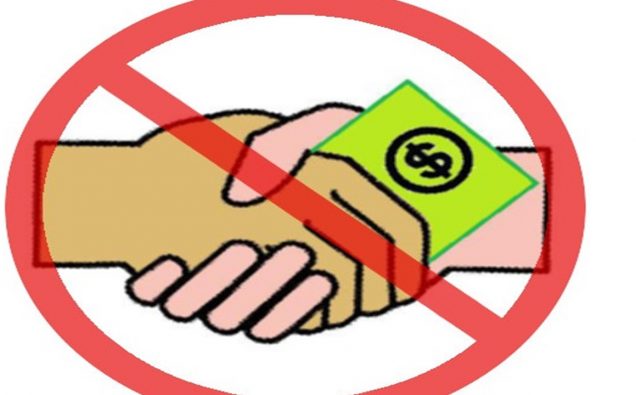
Featured Image Stop Handshake of Corruption by User:Herostratus/Wikimedia Commons
As several political leaders around the world including Prime Minister Nawaz Sharif face investigations in the wake of Panama Papers revelations on hidden wealth, a top UN expert has asked countries to introduce reforms that curb tax fraud.
Juan Pablo Bohoslavsky, the expert on foreign debt and human rights, underlined in a statement that such reforms should enable parties to prevent and denounce tax fraud, rather than facilitating or taking advantage of them.
“The main component of illicit cash flows at the global level is tax fraud. These funds, which circulate and are deposited in the shadows of the financial and corporate systems, consolidate poverty and inequality in the world,” he noted at a Press Conference in Panama as reported by the United Nations.
Bohoslavsky, who made an eight-day trip to Panama on a mission to evaluate the financial system, said, “the most onerous tax evasions must be severely punished within the framework of a comprehensive strategy covering all dimensions of tax fraud.”
He remarked that financial and non-financial intermediaries have the ‘duty of knowing the client’ and should have the obligation to report suspicious transactions.

High rises and hotel buildings in Punta Pacifica, Panama City, Panama. Photo: World Bank/Gerardo Pesantez
The official said the countries must continue to impose greater due diligence on financial and banking institutions.
Since their leak by a group of investigative journalists last year, the Panama Papers scandals have roiled democratic countries. In Pakistan Prime Minister Sharif and family face charges for hiding offshore property from official records. The Opposition politicians are pursuing a case against the Sharif family for owning flats in London and failing to declare them at home as required under the law. A Joint Investigation Team is to further probe charges after a Supreme Court verdict which raised serious questions on the issue.
The UN official visited Panama – a center of companies dealing with offshore assets – to evaluate reforms that may ensure transparency and minimize tax evasion practices.
When pointed out that it was the very lack of regulations on taxes that made Panama appear to some as a “fiscal paradise,” Bohoslavsky noted that the tax component is the most important when companies and wealthy people choose to do business in one country or another, or when simply transferring their funds between countries.
Previously revealed documents, which popularly have been associated with the ‘Panama Papers,’ have shown how corporations, wealthy individuals and politically exposed persons including leaders of several countries have systematically hidden assets in more than 21 offshore jurisdictions, according to the United Nations.
The expert underscored that the focus of the Panamanian authorities should be on the fight against tax evasion. At the same time, he also acknowledged their efforts to promote financial and corporate transparency and to strengthen the financial regulatory system.
He even observed that Panama now has a more robust system than it did a few years ago.
The UN expert advocated for the adoption of clear legislation “to prevent conflicts of interest of public officials and to ensure the autonomy of regulatory agencies.”
He added that such evasions consolidate poverty and inequality because they deprives social programs and services of resources, and do not allow public investment in productive infrastructures that drive development.
In this regard Bohoslavsky recalled that reducing illicit financial flows is clearly linked to reducing poverty and social inequality and will advance the 2030 Agenda and the corresponding Sustainable Development Goals (SDGs).
Curbing such flows was also agreed to at the Third International Conference on Financing for Development held in July 2015 in Addis Ababa.
According to the UN, the outcome, referred to as the Addis Ababa Action Agenda calls for strengthening support for the work of the UN Committee of Experts on International Cooperation in Tax Matters to improve its effectiveness and operational capacity, and engagement with the UN Economic and Social Council.















